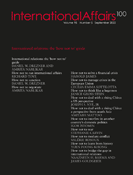How to co-edit a "How Not To Guide" to International Relations
Special Issue alert! SPECIAL ISSUE ALERT!!
Your humble Substacker blogger (I don’t think there’s really a difference) will be attending the American Political Science Association annual meeting, which this year is in Montreal. So let’s let today’s post be about the craft of academic research.
A fun fact that most folks outside of the academy may not know: editing a book with multiple contributors is usually a nightmare. This might sound surprising, as there are many examples of successful edited volumes that have made a significant contribution to international relations. But that is selection bias messing with your head. In truth, most edited volumes sink to the bottom of everyone’s reading pile, never to see the light of day on anyone’s desk.
Why is this? By definition, an edited volume is a grab bag, and it is often viewed to be only as strong as its weakest contributor. Plus, the process of editing these beasts is draining. Imagine pulling teeth from hysterical and curiously strong toddlers. Inevitably, there are one or two contributors who cannot meet a deadline to save their life. There are others who will either try to take over the enterprise or passive-aggressively try to undermine it. Indeed, if you are a junior scholar considering editing a volume anytime soon, stop reading this immediately and text “OH HELL NO” to whomever propositioned you on this idea.
Now that said, I have edited and co-edited a few books in my day. And I learned a few things in the process. First, make sure you have a coherent animating idea that unites the contributors — otherwise the result is a mess. Second, try to work with at least a few contributors who are also friends; it reduces the number of headaches. Third, repeatedly spell out the run of show from first idea to completed product for everyone. The more serious the editors are with the schedule, the more seriously contributors will take stated deadlines. Finally, find a trusty co-editor if at all possible.
I say all of this in order to stress just how much counterintuitive fun I had co-editing (with Amrita Narlikar) a just-released special issue of International Affairs titled “INTERNATIONAL RELATIONS: THE ‘HOW NOT TO’ GUIDE.” Here’s the abstract from the introduction by Amrita and myself:
In the century of International Affairs' existence, there have been a lot of catastrophic critical junctures when a different policy decision, underpinned by an alternative epistemic framing, might have led to a more peaceful and prosperous world. In this special issue, we consider the well-intentioned efforts of humanity over the past century that turned out badly. Much of foreign policy analysis seeks to replicate successes; we humbly ask whether it might make more sense to examine how to avoid disastrous failure. In this introductory article we develop a concrete definition of policy failure and provide a motivation for why the study of failures is relevant for the coming century. We suggest a Hippocratic Oath for policy-minded scholars, and advance guidelines to help go beyond Barack Obama's ‘Don't do stupid shit’ injunction and also guard against potential policy paralysis. Finally, we offer conclusions derived from the other articles in this special issue that are relevant for both the study and practice of international relations. Armed with these insights, practitioners—and the researchers who advise them—may stand a better chance of avoiding some of the worst pitfalls of international relations; occasionally, together, we may even get some things right.
Check out the entire special issue, which will be available to everyone for the next month or so. There are contributors from Canada, the European Union, India, Russia, Singapore, United Kingdom, and the United States. My friend Stephanie Carvin came up with the best title, “How Not To War.” Each of the contributions considers the cognitive and actual policy mistakes made within their particular bailiwicks.
I’ll talk about my own individual contribution to the special issue next week. For now, enjoy perusing it!

